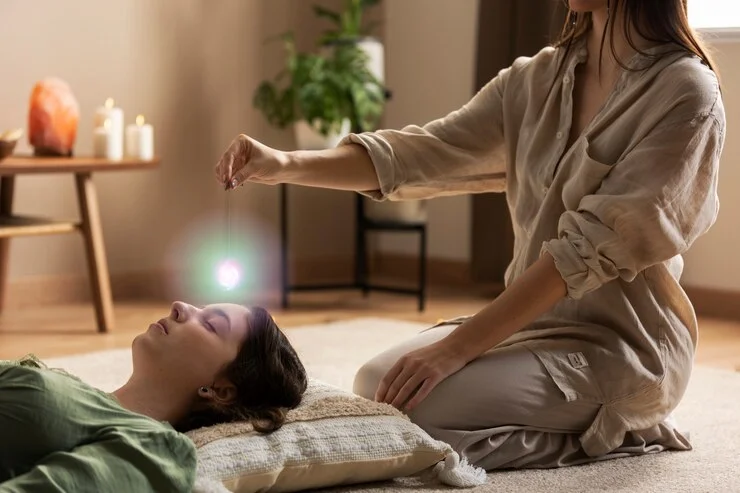Deep Sleep Meditation: Experience Restorative Sleep and Wake Up Refreshed
Benefits of Deep Sleep Meditation for a Restful Night’s Peace
Are you tired of waking up feeling groggy and fatigued despite having a full night’s sleep? Do you find it challenging to quiet your mind and find restorative slumber? Look no further – deep sleep meditation is here to transform your sleep experience and leave you feeling refreshed, rejuvenated, and ready to conquer the day!
In this blog post, we will delve into the world of deep sleep meditation, exploring its benefits, techniques, and the powerful impact it can have on your overall well-being. Whether you struggle with insomnia, stress, or simply want to enhance the quality of your sleep, deep sleep meditation offers a natural and effective solution.

What is Deep Sleep Meditation?
Deep sleep meditation is a practice that combines meditation techniques with the intention of achieving a restful and rejuvenating sleep. It involves guiding your mind into a state of deep relaxation while focusing on calming thoughts and sensations. This powerful practice allows you to quiet the mind, release stress, and sink into a state of peaceful slumber.
Unlike regular meditation practices that focus on maintaining awareness and attention, deep sleep meditation aims to induce a state of deep relaxation to promote deep sleep cycles. By quieting the mind, deep sleep meditation helps you bypass the worries and thoughts that often hinder a good night’s sleep, allowing you to experience profound rejuvenation.
The Benefits of Deep Sleep Meditation
1 Enhanced Relaxation and Stress Reduction
Stress and anxiety are often significant obstacles to a good night’s sleep. Deep sleep meditation provides a powerful tool for releasing tension, quieting the mind, and promoting relaxation. By engaging in deep sleep meditation, you can effectively reduce stress, allowing your body and mind to enter a state of profound relaxation.
2 Improved Sleep Quality
One of the primary benefits of deep sleep meditation is enhanced sleep quality. By cultivating a state of deep relaxation and tranquility, you can experience longer and more restorative sleep cycles. Deep sleep is crucial for bodily repair, memory consolidation, and overall well-being. Incorporating deep sleep meditation into your nightly routine can significantly improve the quality and duration of your sleep.
3 Increased Emotional Well-being
Deep sleep meditation also has a positive impact on emotional well-being. By quieting the mind and reducing stress levels, this practice fosters a sense of inner calm and tranquility. As a result, you may experience improved mood, reduced irritability, and increased overall emotional balance. Deep sleep meditation allows you to start each day feeling refreshed and emotionally grounded.

How to Practice Deep Sleep Meditation
Now that we understand the benefits of deep sleep meditation, let’s explore how to incorporate this practice into your bedtime routine. With the following steps, you can create a peaceful and conducive environment for deep sleep meditation.
1 Find a Quiet and Serene Space
When preparing to engage in deep sleep meditation, it’s crucial to find a quiet and serene space where you can fully relax and focus. Designate a specific area in your bedroom or create a cozy corner where you feel comfortable and free from distractions.
2 Get Comfortable and Relaxed
Before embarking on your deep sleep meditation journey, ensure you are comfortable and physically at ease. Arrange pillows, blankets, or any other props to support your body in a relaxed position. The more comfortable you are, the easier it will be to let go and enter a restful state.
3 Set the Right Mood with Ambient Music or Nature Sounds
Create a tranquil ambiance by playing soothing ambient music or nature sounds in the background. Gentle instrumental melodies, calming rainforest sounds, or ocean waves can help create a peaceful atmosphere that enhances relaxation and deep sleep.
4 Follow a Guided Deep Sleep Meditation
For beginners or those who prefer guidance, following a guided deep sleep meditation can be incredibly beneficial. Numerous meditation apps, videos, and audio tracks are available that provide expert-led guidance through the process. These guided meditations typically incorporate soothing voiceovers, calming music, and relaxation prompts to ease you into deep sleep.
Deep Sleep Guided Meditation: A Powerful Tool for Restful Sleep
Deep sleep guided meditation is an effective technique to assist your journey into a peaceful slumber. By implementing the following steps, you can harness the full potential of deep sleep guided meditation and optimize your sleep experience.
1 Ready Your Mind and Body for Restful Slumber
Before settling into your bedtime routine, it’s crucial to prepare your mind and body for sleep. Create a relaxing evening ritual that includes activities such as reading a book, taking a warm bath, or engaging in gentle stretches. Wind down from the day’s activities to gradually transition into a calm mental state that is conducive to deep sleep.
2 Create a Relaxing Bedtime Routine
Establishing a consistent bedtime routine is key to signaling to your body and mind that it’s time to unwind and prepare for slumber. Engage in activities such as journaling, light stretching, or sipping a cup of herbal tea to set the tone for relaxation. Consistency in your bedtime routine will help condition your body to recognize when it’s time to initiate deep sleep meditation.
3 Engage in Deep Sleep Guided Meditation
After getting ready for sleep, it’s important to engage in deep sleep guided meditation. To start, find a comfortable position, close your eyes, and focus on your breath. Follow the guidance of the meditation track, allowing it to lead you into a state of deep relaxation. Embrace the calming instructions and visualize yourself drifting into a restful sleep.
Meditation for Deep Sleep: An Effective Way to Quiet Your Mind
Meditation for deep sleep offers a pathway to tranquility by calming the mind and releasing stressful thoughts. By incorporating the following techniques into your practice, you can create an optimal environment for a quiet and rejuvenating sleep.
1 Practice Mindfulness Meditation
Mindfulness meditation is a technique that involves focusing your attention on the present moment. By anchoring your awareness to the sensations of your breath or body, you can observe your thoughts and emotions without judgment. This practice cultivates mental clarity, reduces stress, and prepares your mind for deep sleep.
2 Cultivate a Calm and Focused Mindset
To quiet your mind and enhance the effects of deep sleep meditation, it’s essential to cultivate a calm and focused mindset. Release any lingering thoughts or worries by gently acknowledging them and letting them go. Affirmations, positive thoughts, and gratitude practices can also help shift your mindset to a state of tranquility and relaxation.
3 Use Visualization Techniques
Visualization techniques can be a powerful tool to enhance your deep sleep meditation experience. As you enter a relaxed state, imagine yourself in a peaceful and serene setting, such as a tranquil beach or a lush forest. Engage your senses and immerse yourself in the sights, sounds, and sensations of this imagined sanctuary. Visualization techniques can deepen your relaxation and aid your journey into restful sleep.

Deep Relaxation: The Gateway to Sound Sleep and Rejuvenation
Deep relaxation is the gateway to achieving restorative sleep and overall rejuvenation. By implementing the following methods, you can enhance the depth of your relaxation, allowing for a more profound sleep experience.
1 Progressive Muscle Relaxation
Progressive muscle relaxation is a technique that involves systematically tensing and releasing different muscle groups throughout the body. By intentionally tensing and then relaxing each muscle group, you can promote a state of deep relaxation and release any residual tension that may hinder your sleep. Start from your toes and work your way up to your head, ensuring that each muscle group fully relaxes before moving on to the next.
2 Breathing Exercises for Deep Relaxation
Conscious breathing exercises are an integral part of reaching a state of deep relaxation. Focus on taking slow, deep breaths, allowing your abdomen to rise as you inhale and fall as you exhale. This diaphragmatic breathing technique helps activate the body’s relaxation response and quiet the mind, preparing you for a night of deep sleep.
3 Incorporate Relaxing Scents or Essential Oils
Aromatherapy can play a significant role in enhancing relaxation and promoting deep sleep. Incorporate relaxing scents or essential oils such as lavender, chamomile, or sandalwood into your bedtime routine. These soothing aromas can help calm the mind, reduce anxiety, and prepare your senses for optimal sleep.
Conclusion: Embrace Deep Sleep Meditation for Optimal Rest and Renewal
Incorporating deep sleep meditation into your nightly routine can transform your sleep experience, leading to enhanced well-being and improved quality of life. By quieting the mind, releasing tension, and inducing deep relaxation, this practice allows you to tap into the transformative power of restorative sleep.
Through techniques such as deep sleep guided meditation, mindfulness meditation, and deep relaxation methods, you can pave the way to a rejuvenating sleep environment. Embrace the potential for enhanced sleep quality, reduced stress, and increased emotional well-being by incorporating deep sleep meditation into your life.
Start your journey to restful slumber tonight. Find a quiet corner, choose a guided meditation track, and allow yourself to surrender to the profound benefits of deep sleep meditation. Experience the wonders of a revitalized mind and body as you awaken each morning feeling refreshed, restored, and ready to embrace life’s limitless possibilities.
Remember, deep sleep meditation is not an overnight solution. Consistency is key. Make it a regular part of your routine and allow the transformative power of deep sleep to unfold gradually. Sweet dreams!







